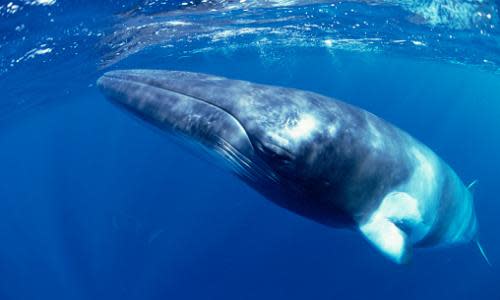Australia could launch legal challenge to Japan's 'scientific' whaling hunts

The environment minister, Melissa Price, has not ruled out taking legal action to challenge Japan’s so-called “scientific” whaling hunts.
An international law expert says prospects for a legal case against Japan’s whaling program, which is carried out under an International Whaling Commission clause that allows for scientific whaling, have strengthened after the recent IWC meeting in Brazil, and would get even stronger if Japan followed through on its threat to leave the commission.
However, the minster has rejected calls from conservationists and the Greens to send a customs ship to monitor the Japanese whale hunt this summer.
In a statement to Guardian Australia, Price said: “Sending a vessel to the Southern Ocean will not stop Japan whaling, nor would it achieve any other policy or legal objectives. While the government has not initiated further legal action to date, it is always an option.”
She said the government was “resolutely opposed to all forms of commercial and so-called ‘scientific’ whaling”.
Price’s comments came after the Australian government was praised for its diplomatic efforts at last week’s IWC meeting in Brazil, where a proposal by Japan to end the 33-year moratorium on commercial whaling was voted down.
Labor and the Greens have joined conservation groups, who have said the “win for the whales” in Brazil needs to be followed up with Australian government action to block Japan’s plans to kill 333 minke whales in the Southern Ocean this summer. They also called for legal action against Japan.
“In the cold light of day, we are still looking at Japan killing whales in the Southern Ocean and that needs to be challenged,” the director of the Australian Marine Conservation Society, Darren Kindleysides, said.
The shadow environment minister, Tony Burke, agreed: “Doing nothing will be taken by Japan to be turning a blind eye. Every summer the Abbott-Turnbull-Morrison government fails to act sees hundreds more whales being harpooned when they should have been protected.”
In 2013, when the Coalition was in opposition, the then shadow environment minister, Greg Hunt, criticised the Labor government for not redeploying a customs vessel to monitor Japan’s activities. But the Coalition was itself criticised when, after winning government, it did not send a customs vessel.
The Greens’ environment spokeswoman, Sarah Hanson-Young, said the government was ignoring its own election promises. “We must prepare to send a vessel to our southern waters and investigate our legal options. In 2018 and beyond, no whales should die from barbaric harpooning.
“If the government refuses to send a vessel to the Southern Ocean and take fresh legal action, Japan will kill hundreds of whales this summer on the Morrison government’s watch.”
In the wake of its IWC defeat, Japan said it would review its membership of the commission and could pull out of it entirely.
Nicola Beynon, a whale conservation campaigner at Humane Society International Australia, said after Australia’s work in Brazil “we need the same from the ministerial level of government – from the prime minister, the foreign minister and the environment minister – to maintain that leadership and pressure on their counterparts in Japan”.
Kindleysides said Japan’s scientific whaling was “just commercial whaling in disguise”, adding: “We believe the time for a country like Australia or New Zealand to challenge them in the international courts is now.”
In 2014, Australia successfully challenged Japan’s scientific whaling program in the international court of justice, but Japan restarted its program two years later.
In 2015, Don Rothwell, a professor of international law at the Australian National University, led a panel to produce legal advice for AMCS and the International Fund for Animal Welfare on steps a government could take.
Countries can choose to exclude themselves from certain jurisdictions of the ICJ and Rothwell said since the 2014 case, Japan had effectively blocked a return to that same court on whaling issues.
However, Rothwell said Australia could prepare a legal case through the UN convention on the law of the sea.
He said: “In article 65 of that convention, it asks states to work cooperatively towards the conservation of marine mammals. The view of the panel was that we thought there was an argument to be made that Japan’s [scientific whaling program] was not consistent with article 65.”
Rothwell said if Japan was to follow through on its threat to leave the IWC, this would strengthen a legal case, as Japan could no longer argue its whaling was valid under the IWC’s scientific whaling clause.
A further positive in a legal case, Rothwell said, was the formal position of the IWC, adopted in Brazil, that Japan had failed to make a case that it needed to kill whales to study them.

 Yahoo News
Yahoo News 